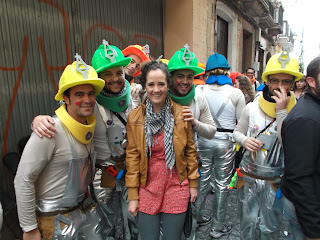This past week was Cadiz Carnaval, or as one of my friends put it; the Most Wonderful Time of the Year. What could be better than day after day of dressing up, letting go of reality, and hitting the streets with your friends? It almost gives the Biblical phrase, "Let us eat, drink, and be merry for tomorrow we shall die" a literal meaning for me. The entire week I ate, drank, and was merry and now I am in bed with a fever feeling like I am going to die. I wouldn't take it back for the world. However, for me its not so much the partying that calls my attention as the pure arte gaditano in the form of singing groups (chirigotas, comparsas, coros, quartets, etc) that compete for weeks leading up to carnaval then spend the entire week performing all throughout the streets.
While many of the chirigotas are difficult to understand at first (they are full of local jokes and colloquialisms that even other Spaniards from outside of Cadiz have difficulty catching), one of my favorite pastimes is choosing a few quality groups and learning their songs. With the help of my Spanish peeps who translate from local Spanish in actual Spanish I have been able to get a good grip on a few of the chirigotas, and have come up with what I consider to be the 3 main elements of a chirigota:
1. Politics
Arguably the most important part of the chirigotas, you can't miss the chance to take a jab at Rajoy (Prime Minister of Spain), King Juan Carlos, the mayor, or basically any governmental or administrative office. The theme of 2013 seems to be Rajoy and his recortes, or budget cuts. The people especially bemoan the cuts in education and healthcare, furious that a ride in an ambulance now costs 5 euro as opposed to being free like before. (FIVE euros. I'm sometimes tempted to mention that its $500+ in the USA, but then what's the point of starting the typical USA vs SPAIN conversation?)
With budget cuts being a hot topic this year, it makes sense that one of the most popular groups uses their chorus to respond loud and clear to Rajoy's cutbacks by telling him to "recortate un huevo".
 |
| See those scissors, Rajoy? Better watch out. |
2. La Crisis
It's sad but true; the economic crisis in Spain is constantly at the top of everybody's mind. This is especially true in Cadiz, whom people have lovingly nicknamed "Capital iberamericano del desempleo", Iberian capital of unemployment. They sing about not being able to buy food for their families, about families losing their houses to the bank, and about not being paid at work. As the chorus of another group spells it out loud and clear:
Superamos los recortes de Rajoy y Zapatero
Superamos con el Cadiz por lo menos seis descensos
Superamos al fin del mundo pero mas difícil va a ser;
Superar en 2013 al final del mes!
ROUGHLY translated:
We can overcome the cutbacks of Rajoy and Zapatero
We can deal with six relegations of the Cadiz soccer team
We can even reach the end of the world, but its going to be even more difficult to:
Make it to the end of the month (or next paycheck) in 2013!
 |
| Highway to Cadiz: city of unemployment |
3. R-rated material
Yes, a chirigota wouldn't be complete without the smattering of jokes that make prim and proper people blush and try to hide their laugh, and leaves gaditanos rolling on the floor with laughter. You can count on at least one joke about the male anatomy, and this year '50 Shades of Gray' makes multiple appearances. There's no need for more details... Lets just say that considering the other main topics of the chirigota, this provides much needed pure comic relief. It also shows the thin line that Spaniards constantly walk between funny and inappropriate.
 |
| *gasp* did they really just say that?? |
All in all, I had a really great time enjoying the essence of Carnaval and basically becoming chirigota groupie #1:
 |
| Cadiz 3020: Los que acabaron el segundo puente |
 |
| Los erasmus pocos y pario la abuela |
 |
| Cadiz 3020: Los que acabaron el segundo puente |
 |
| Las autenticas |
 |
| Los cabrones |
 |
| Los erasmus pocos y pario la abuela |
 |
| Los recortaos |



